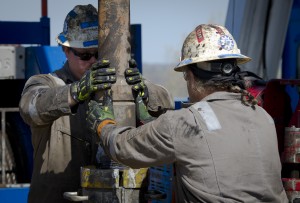Jason Marshall, chief deputy director of the California's Department of Conservation, said decades of fracking in California have left no evidence that groundwater has been contaminated.
"I know the absence of evidence is not proof," Marshall said. "We pride ourselves on having very good well construction standards in place that are stronger than many other states."
The release of the draft was the first step in creating new regulations at a time when the state is poised for a possible oil boom. Last week, federal land managers auctioned off nearly 18,000 acres of oil leases on public lands in Central California.
That's where California's Monterey Shale formation is located. The formation contains more than 15 billion barrels of "technically recoverable shale oil," more than the amount contained in the Bakken oil fields of Montana and North Dakota, according to a U.S. Energy Information Administration estimate.
What's not known is whether fracking is the best method for recovering the energy resource, said Tupper Hull, a spokesman for the Western States Petroleum Association.
"There's quite a bit of exploration taking place and people trying to answer that question," Hull said. "We think the jury is still out on whether or not this resource can be developed, but there's no question there's a lot of energy locked in that shale."
The public will have a chance to comment on the proposed rules early in 2013 in a process that will take about a year to finalize.
"These regulations ... go well beyond disclosure requirements to require rigorous testing and evaluation before, during and after hydraulic fracturing operations to ensure that wells and geologic formations remain competent and that drinking water is not contaminated," the agency said in comments posted on its website.
"Some of the testing and evaluation requirements of the proposed regulations have not yet been implemented by any other state," it said.
While the chemical disclosure requirement was hailed by some fracking critics as an important step forward, California's draft rules also include a "trade secrets" exemption.
The trade secrets exemption would allow a company to bypass public reporting of the specific chemicals in "fracking fluid" if that information would reveal secrets that competitors could use to gain an advantage.
In lieu of specifics, companies would be required instead to post the "chemical family or similar descriptor" for the agents it is using.
Doctors and nurses treating anyone harmed by a chemical spill or groundwater contamination would be required to sign non-disclosure agreements before a trade-secret protected company would identify the chemicals it uses.
In addition, the privately-owned website on which operators would be required to report the chemicals — FracFocus.org — has been criticized as hard to use and not subject to freedom of information laws.
"These draft regulations would keep California's fracking shrouded in secrecy and do little to contain the many threats posed by fracking," Kassie Siegel of the Center for Biological Diversity said in a statement.
KQED Science's Lauren Sommer has broken up the proposed regulations into different categories:
Public Disclosure
- Drillers would be required to notify the state at least 10 days in advance of beginning hydraulic fracturing. DOGGR will post that information online within seven days, giving the public a minimum of three days of notice.
Landowners would not get direct notification when fracking takes place near or on their land. “What is the harm in letting someone know that fracking or oil drilling will occur next door to them?” asks Bill Allayaud of the Environmental Working Group.
- There is also a provision for “confidential wells.” If an oil and gas company is drilling in a new oil field, their activities, including fracking, can be kept secret for two years. State regulators say this allows oil companies to explore new areas for a period of time before they reveal information to their competitors.Operators would have to disclose what chemicals they’re using during fracking and their concentrations are – except in cases where they claim the information would give competitors an advantage. In that case, they must disclosure the general chemical family or other information.
- Trade secret exemptions, as they’re known, have been controversial in other states. In Texas, where they’ve been claimed 19,000 times in the last year, lawmakers are concerned the exemptions have become a loophole.
Well Construction
- Oil companies would be required to look for old wells and geologic faults that could allow fracking fluids to reach the groundwater supply. “We are leading or are on the cutting edge in a number of areas,” says Jason Marshall, Chief Deputy Director of the California Department of Conservation. “Texas has proposing a regulation like that, but no other states have adopted it.”
- Oil companies would be required to look for weaknesses in well construction by pressure testing before hydraulic fracturing. They’ll have to monitor the well during hydraulic fracturing and for 30 days after.
When the well casing fails (the metal pipe that contains the well), companies must report it to state regulators, but the information is not part of the public disclosure process. DOGGR doesn’t know how many wells fail a year in California, though they say the information is contained in public documents.
